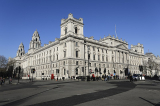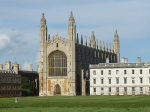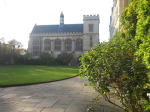
Culture
-
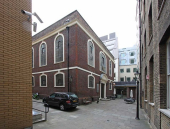 Chief Rabbi supports Bevis Marks campaign
Chief Rabbi Sir Ephraim Mirvis has issued a direct appeal to protect the historic Bevis Marks Synagogue, highlighting the opposition of nearly 1,000 people to theRead More...
Chief Rabbi supports Bevis Marks campaign
Chief Rabbi Sir Ephraim Mirvis has issued a direct appeal to protect the historic Bevis Marks Synagogue, highlighting the opposition of nearly 1,000 people to theRead More... -
 Charles III receives new title at Chelsea Flower Show
During a visit to the Chelsea Flower Show, King Charles III was endearingly dubbed "King of the Compost" by a group of school pupils. The children, who met theRead More...
Charles III receives new title at Chelsea Flower Show
During a visit to the Chelsea Flower Show, King Charles III was endearingly dubbed "King of the Compost" by a group of school pupils. The children, who met theRead More... -
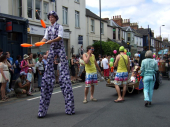 Street carnival to return after five years
The Cowley Road Carnival is set to make its highly anticipated return to Oxford's Cowley Road on 1 September, marking its first appearance since 2019. The annual summer event, which drawsRead More...
Street carnival to return after five years
The Cowley Road Carnival is set to make its highly anticipated return to Oxford's Cowley Road on 1 September, marking its first appearance since 2019. The annual summer event, which drawsRead More... -
 London's best kept secret: the hidden garden amidst ruins near London Bridge
Tucked away just a stone's throw from London Bridge lies one of the city's most enchanting secrets. The ruins of St Dunstan-in-the-East church stand quietly, almost unnoticed amidst theRead More...
London's best kept secret: the hidden garden amidst ruins near London Bridge
Tucked away just a stone's throw from London Bridge lies one of the city's most enchanting secrets. The ruins of St Dunstan-in-the-East church stand quietly, almost unnoticed amidst theRead More... -
 Sir Paul McCartney becomes first UK billionaire musician
Sir Paul McCartney has made history as the first UK musician to become a billionaire, according to the Sunday Times Rich List. The 81-year-old former Beatle increased his wealth by £50 millionRead More...
Sir Paul McCartney becomes first UK billionaire musician
Sir Paul McCartney has made history as the first UK musician to become a billionaire, according to the Sunday Times Rich List. The 81-year-old former Beatle increased his wealth by £50 millionRead More... -
 London welcomes Gucci's high-stakes debut cruise collection
As dusk descended over the River Thames, the anticipation outside London's iconic Tate Modern was palpable. Among the luminaries gracing the event were supermodel Kate Moss, actressRead More...
London welcomes Gucci's high-stakes debut cruise collection
As dusk descended over the River Thames, the anticipation outside London's iconic Tate Modern was palpable. Among the luminaries gracing the event were supermodel Kate Moss, actressRead More... -
 Dutch Eurovision contestant Joost Klein disqualified after backstage incident
The Dutch artist Joost Klein has been disqualified from the Eurovision Song Contest following a backstage incident, as reported by Swedish police after a female member of the productionRead More...
Dutch Eurovision contestant Joost Klein disqualified after backstage incident
The Dutch artist Joost Klein has been disqualified from the Eurovision Song Contest following a backstage incident, as reported by Swedish police after a female member of the productionRead More... -
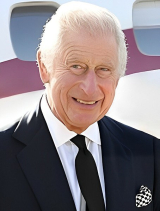 King Charles assumes historic patronage ties to monarchy spanning over 200 years
In 2022, Buckingham Palace announced a comprehensive review of all royal patronages. Following the passing of Queen Elizabeth II, nearly 500 charities and organizations found themselvesRead More...
King Charles assumes historic patronage ties to monarchy spanning over 200 years
In 2022, Buckingham Palace announced a comprehensive review of all royal patronages. Following the passing of Queen Elizabeth II, nearly 500 charities and organizations found themselvesRead More... -
 Homes England pledges £120,000 investment in Northstowe community initiatives
Homes England, the governmental body overseeing housing and urban revitalization efforts, has unveiled plans to allocate £120,000 in grant funding to support community-driven initiativesRead More...
Homes England pledges £120,000 investment in Northstowe community initiatives
Homes England, the governmental body overseeing housing and urban revitalization efforts, has unveiled plans to allocate £120,000 in grant funding to support community-driven initiativesRead More... -
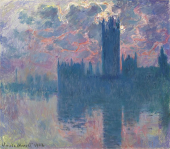 Fake Monet and Renoir paintings detected on eBay using AI
Up to 40 counterfeit paintings, including alleged works by Monet and Renoir, have been identified for sale on eBay, according to research conducted by Dr. Carina Popovici, an expertRead More...
Fake Monet and Renoir paintings detected on eBay using AI
Up to 40 counterfeit paintings, including alleged works by Monet and Renoir, have been identified for sale on eBay, according to research conducted by Dr. Carina Popovici, an expertRead More... -
 Pippa Middleton and James Matthews unveil lodge at Bucklebury Farm
Pippa Middleton and her billionaire husband James Matthews have inaugurated the lodge at Bucklebury Farm Park in Berkshire, offering a venue for parties, events, and Pilates sessions.Read More...
Pippa Middleton and James Matthews unveil lodge at Bucklebury Farm
Pippa Middleton and her billionaire husband James Matthews have inaugurated the lodge at Bucklebury Farm Park in Berkshire, offering a venue for parties, events, and Pilates sessions.Read More... -
 Five British museums nominated for prestigious arts prize
Museums across Skipton, Dundee, Manchester, and London are vying for the esteemed title of Museum of the Year 2024.Read More...
Five British museums nominated for prestigious arts prize
Museums across Skipton, Dundee, Manchester, and London are vying for the esteemed title of Museum of the Year 2024.Read More... -
 Gustav Klimt portrait sells for £25.7 million at Vienna auction
A long-lost portrait by Gustav Klimt, depicting a young woman, fetched a staggering 30 million euros (£25.7 million) at an auction held in Vienna on Wednesday.Read More...
Gustav Klimt portrait sells for £25.7 million at Vienna auction
A long-lost portrait by Gustav Klimt, depicting a young woman, fetched a staggering 30 million euros (£25.7 million) at an auction held in Vienna on Wednesday.Read More...

British Queen celebrates
Most Read
- Teen held after US woman killed in London stabbings
- Heave-ho Harry! Prince prepares to join the walking wounded in ice trek to North Pole
- Football: Farhad Moshiri adamant Everton deal above board
- "Master of English Style". Interview with Designer Lydia Dart
- Letter to the Financial Times from Lord Mayor Alderman Michael Bear
UK news
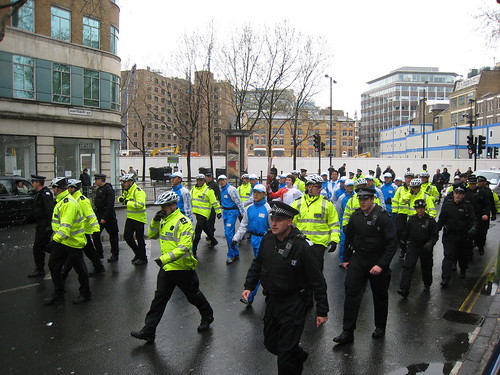
An Islamist terror suspect in Britain charged with breaking restrictions on his movements had crossed through London's Olympic Park five times, newspapers reported Sunday.
The 24-year-old -- named only as CF -- is suspected of being a militant for Somalia's Al-Qaeda-allied Shebab rebels, The Sunday Telegraph and the Sunday Mirror said.
He is one of nine people suspected of being a risk to national security who are subject to Terrorism Prevention and Investigation Measures (TPIM) -- legal orders which restrict movements, contacts and computer use.
The Sunday Mirror said he was a British jihadist. The Sunday Telegraph said he comes from a large Somali family in north London.
CF was deported from Somalia back to Britain in March last year.
He served two months in jail for a previous absconding offence before being released and placed under the TPIM restrictions and ordered to live in Norwich, eastern England.
He wears an electronic tag allowing the authorities to track his movements.
CF was arrested again last month and charged with five separate breaches of an order banning him from using the train route which passes through the Olympic Park in Stratford, east London.
The alleged offences occured between April and May.

This June was the wettest since records began, with double the average rain falling during the month, the Met Office has said.
Provisional figures showed the UK received 145.3mm (5.7 inches) during June, beating the previous record of 136.2mm (5.4 inches) seen in June 2007.
It is the second month this year to see record-breaking amounts of rain, after this April became the wettest in the records dating back more than a century to 1910.
June saw long, prolonged rainfall and short but exceptionally heavy showers, and ended with freak storms which battered areas of the Midlands and the North East. The exceptional amount of rain caused floods in Wales and parts of England.
Last month was also the one of the dullest Junes on record, with just 119.2 hours sunshine, only slightly less miserable than June 1987 when a record low of 115.4 hours was recorded. And the UK has experienced the coolest June since 1991, with average temperatures of 12.3C (54F).
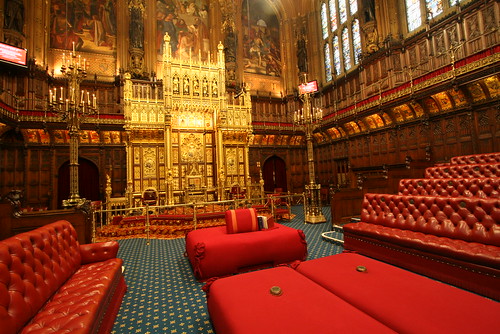
Peers have lined up to launch a fresh assault on Nick Clegg's plans for House of Lords reform, with one ex-minister saying the proposals published this week were already "doomed" and another claiming they were as unpopular as the poll tax.
Tory former Cabinet minister Lord Fowler said he would oppose the plans and predicted the majority of his colleagues would also fail to support the Deputy Prime Minister's flagship constitutional reforms.
The legislation, driven by Mr Clegg and central to the Liberal Democrats' agenda in the coalition, would introduce an 80% elected Upper House and slim membership down from 800 to 450.
It would finally complete the removal of hereditary peers from the Second Chamber and introduce the first elected members in tranches of 120 at each of the next three general elections, with the process of change completed by 2025.
Elected members would serve for a single 15-year term and would be able to claim a £300 daily allowance for attendance, but unlike the present arrangements that sum would be taxed.
But Lord Fowler, who served as a Cabinet minister in the Thatcher administration, said the proposals were as unpopular as the decision to introduce the community charge or "poll tax" as it became known.
"Not since we introduced the community charge has the political and public response been so unequivocal," he told the House of Lords.

Two men have been arrested on suspicion of the commission, preparation or instigation of acts of terrorism, police have said.
The men, aged 18 and 32, are being held at a central London police station under the Terrorism Act 2000, Scotland Yard said.

The Conservatives are out of touch because they are listening to those with power and influence and not working people, Labour's leader will say.
Ed Miliband will tell the national conference of the Unite union there was "no place at the table" for decent hard-working families. He will contrast the way Labour and trade unions are reconnecting with people in workplaces and communities, with the "out of touch" coalition Government.
"Why are the Tories so out of touch? Because they are listening to the wrong people. They are listening to those who already have power and influence and not to the working people of this country.
"They have cosy kitchen suppers for the privileged. Cosy country suppers for the powerful, but there is no place at the table for decent hard-working families."
Mr Miliband will attack the Government for "doing nothing" to help hundreds of workers at the Coryton oil refinery in Essex set to lose their jobs because of the site's closure.
"Turning away where governments in other countries would have stepped in. Six hundred jobs gone because the Government didn't listen to working people, because it wouldn't even ask the European Commission whether there was something it could do, because this Government thinks the role of government is to sit back and do as little as possible."

Millions of NatWest bank customers faced financial trouble this weekend after technical glitches left angry clients unable to pay bills, access their accounts, and even receive their wages.
The upheaval extended beyond the bank's customers, with the Guardian website reporting that one couple who do not bank with NatWest were unable to move into their new home because of the glitch.
Customers at Royal Bank of Scotland (RBS) and Ulster Bank were also affected. All three banks are part of the RBS Group.
NatWest left more than 900 branches open until 6pm on Saturday, with plans to open them again until midday on Sunday as it works to clear the backlog.
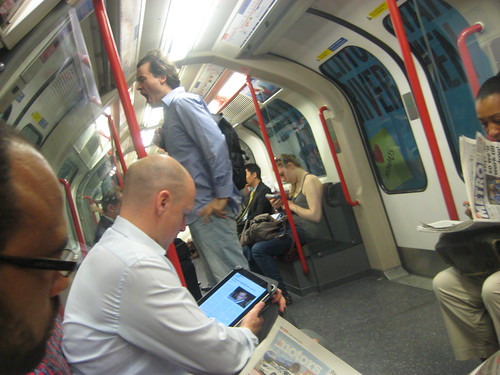
Passengers are facing a twin threat of travel disruption because of two separate disputes involving Tube workers.
Members of the drivers' union Aslef working on London Underground's (LU) Piccadilly line are due to stage a 24-hour strike next Thursday over the sacking of a colleague, with further dates to be announced.
In another row over jobs and conditions, members of the Rail, Maritime and Transport (RMT) union based at a control centre in west London are set to stage walkouts from July 1-4 and ban overtime from July 8-15.
RMT leader Bob Crow said: "This group of workers are absolutely key to delivering the service on the Piccadilly line and sub-surface railways and the way that they have been treated by the management at a time when the system is under intense pressure is nothing short of shocking."
Phil O'Hare, LU's Piccadilly line general manager, said: "It is disappointing that Aslef has threatened to take strike action on the Piccadilly line, especially when only a third of those balloted have voted for industrial action.
"This train operator was dismissed for gross misconduct after knowingly passing a signal at danger and then proceeding with passengers on board without authority, without knowing the cause of the danger signal, and without notifying service control.
"The train operator has lodged an employment tribunal complaint, which is the appropriate way for this matter to be dealt with, not through threats of industrial action in defence of behaviour that Aslef itself does not condone."

It is vital that the Egyptian elections lead to "legitimate, accountable and democratic governance", William Hague has said.
The Foreign Secretary said he welcomed the peaceful conduct of the polls, but the country faced a "critical moment".
It is just over a year since a violent revolution saw Hosni Mubarak being forced to step down from the presidency.
The Muslim Brotherhood's Freedom and Justice Party says its chairman, Mohammed Mursi, received 52% of the vote, while former prime minister Ahmed Shafiq said he had 48%.
The official results are not due to be announced until Thursday but the Islamist movement, which will most likely be leading the country, is set to protest against a decree the ruling military generals have put in place.
The decree ordered the immediate dissolution of parliament after the Supreme Constitutional Court ruled that the law governing the first elections were unconstitutional as party members had been allowed to contest seats reserved for independents.
The second decree amended the March 2011 constitutional declarations by giving generals complete control over legislation and military affairs until fresh parliamentary elections are held.
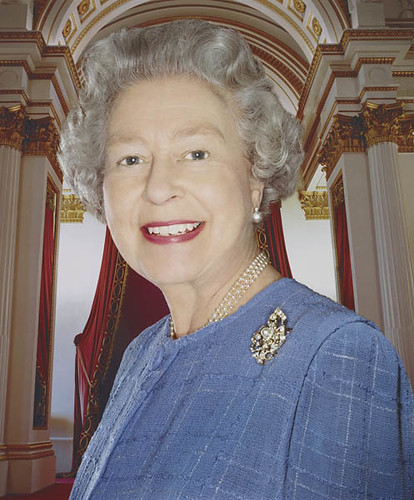
Buckingham Palace is tight-lipped about how the Queen came to suffer an extremely bloodshot eye.
The red left eye was clearly visible in photographs taken as she watched polo players take to the field at the Cartier Queen's Cup Final, in Surrey.
A Buckingham Palace spokesman declined to comment on how the Queen suffered the red eye but said "nothing untoward" had happened and the monarch was in "fine fettle".
The final, at Guards Polo Club, in Windsor Great Park, Egham, is rated as one of the world's top five polo events, attracting some of the best international players.

Queen Elizabeth II will on Wednesday attend a Commonwealth luncheon in London following a grand four-day diamond jubilee celebration which was marred by the illness of her husband, Prince Philip.
The queen will host heads of government and representatives of the Commonwealth nations at Marlborough House, but will be without her husband who is recovering from the bladder infection that hospitalised him on Monday.
The couple's youngest son Prince Edward told reporters after visiting Philip in hospital that his father was "getting better" but he will remain in hospital for several days and that the queen was "bearing up but missing him."
The monarch on Tuesday brought the official public celebrations to a close when she greeted 1.5 million cheering subjects from the balcony of Buckingham Palace.
A dramatic flypast capped four days of celebrations marking her 60th year on the throne as the crowd waved Union Jack flags at the monarch and her family, surrounding the palace in a sea of red, white and blue.
The 86-year-old monarch later said in a special television message shown across the nation and the Commonwealth that the jubilee had been a "humbling experience."
"It has touched me deeply to see so many thousands of families, neighbours and friends celebrating together in such a happy atmosphere," the queen said.
"I will continue to treasure and draw inspiration from the countless kindnesses shown to me in this country and throughout the Commonwealth," she added. "Thank you all."
The queen braved the rain with her heir Prince Charles and his wife Camilla as well as Prince Harry, Prince William and his wife Catherine to wave from the balcony.
"We were told by police that there were 1.5 million in and around The Mall area," a spokeswoman for Buckingham Palace told AFP in reference to the packed avenue running from the palace to Trafalgar Square.
The crowd boomed the national anthem as historic World War II planes flew overhead, followed by the Royal Air Force Red Arrows display team who filled the skies with plumes of red white and blue smoke.
The queen's guard also released celebratory cascades of rifle fire.
Minutes earlier, the royals had driven to the palace from the Houses of Parliament in horse-drawn carriages, again cheered by thousands -- many of whom camped out overnight to get a glimpse of the queen.
Military bands and more than 100 mounted soldiers in traditional uniform accompanied the carriages in a classic display of British pageantry. Banners saying "Elizabeth the Great" were held above the crowd.
In Philip's absence, Charles and Camilla joined the queen, who was dressed in a mint-green silk coat scattered with crystals, in the red and gold 1902 state landau.
Prince Harry joined William and Catherine, who wore a beige lace dress by Alexander McQueen, as they smiled and waved from their own carriage -- their first such carriage trip since William and Catherine married in April 2011.
Charles had earlier taken his father's place by the queen's side at a special jubilee service at St Paul's Cathedral attended by political leaders, foreign ambassadors and royals.
Leading the service beneath the imposing dome of the cathedral, Rowan Williams, the Archbishop of Canterbury and leader of the world's Anglicans, paid tribute to Philip as well as the monarch.
"We are marking six decades of living proof that public service is possible and that it is a place where happiness can be found," said Williams, adding that their prayers were with Philip.












